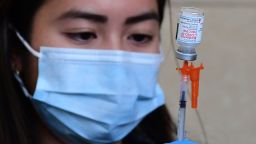US Centers for Disease Control and Prevention Director Dr. Rochelle Walensky signed off on Covid-19 vaccinations for children under 5 on Saturday, clearing the way for vaccinations to be administered soon.
This move comes after vaccine advisers to the CDC voted unanimously on Saturday in support of recommending the Moderna and Pfizer/BioNTech Covid-19 vaccines to children as young as 6 months.
“Together, with science leading the charge, we have taken? another important step?forward?in our nation’s fight against COVID-19. We know millions of parents and caregivers are eager to get their young children vaccinated, and with today’s decision, they can,” Walensky said in a statement. “I encourage parents and caregivers with questions to talk to their doctor, nurse, or local pharmacist to learn more about the benefits of vaccinations and the importance of protecting their children by getting them vaccinated.”???
Vaccinations may not begin until Tuesday in some places.
President Joe Biden praised the CDC’s decision to recommend the vaccines on Saturday.
“Today is a monumental step forward in our nation’s fight against the virus, with virtually every American now eligible for the protections that COVID-19 vaccines provide,” Biden said in a written statement, adding: “For parents all over the country, this is a day of relief and celebration.”
Walensky signed off on the administration of two doses of Moderna’s vaccine in children ages six months to 5 years, and three doses of Pfizer’s vaccine in children ages six months to 4 years. The CDC’s Advisory Committee on Immunization Practices (ACIP) noted on Saturday that if any Pfizer vaccine is given, then the vaccination series needs to contain three doses.
“We’ll be monitoring inventory as the vaccines are delivered starting Monday to clinics, pharmacies and other clinical settings to determine when the search for the under-five vaccines will be available on vaccines.gov,” Dr. Kevin Chatham-Stephens, the Pediatric Vaccine Planning and Implementation Lead with the CDC’s Vaccine Task Force, said in ACIP’s meeting.
“Parents and caregivers can reach out to the child’s pediatrician or family practice doctor or a local health department, pharmacy, et cetera to ask if they have the vaccine, understanding that not every clinic or pharmacy will get their vaccine on Monday.”
The Moderna and Pfizer/BioNTech Covid-19 vaccines are now authorized for young children
On Friday, the US Food and Drug Administration expanded the emergency use authorizations for Moderna’s vaccine to include children 6 months through 17 years and Pfizer/BioNTech’s for children 6 months through 4 years.
The CDC’s vaccine advisers will be discussing use of the Moderna vaccine in older children ages 6 to 17 years of age at their meeting June 23.
About 17 million kids under the age of 5 are now are eligible for Covid-19 vaccines.
Covid-19 is the leading cause of infectious disease-related death in people up to 19 years old, but data shows that those deaths can be prevented through vaccination, Dr. Matthew Daley said in Friday’s ACIP meeting.
“Covid-19 is the leading cause of death among infectious diseases for people ages 0 to 19 years. And Covid-19 is the seventh most common of all causes of death for people ages 0 to 19 years,” Daley, senior investigator with the Institute for Health Research at Kaiser Permanente Colorado, told the committee.
“Through March of 2022, unvaccinated people 5 years of age and older had 10 times the risk of dying from Covid-19 compared to those vaccinated with at least the primary series,” Daley said, adding that in other words, the data “provide real-world evidence that most deaths from Covid-19 are preventable through vaccination.”
In Saturday’s ACIP meeting, Dr. Veronica McNally said she was “struck” by the impact Covid-19 has had on children.
“I am struck by these numbers: 2 million cases, 20,000 hospitalizations and over 200 deaths. And I am also concerned that there’s really an underappreciation for the potential severity of a respiratory virus in kids in this age and an unclear understanding sometimes in parents about the long-term consequences, including MIS-C,” McNally said.
Will the youngest children get vaccinated?
Many public health experts worry that even though the Covid-19 vaccines are now authorized for younger age groups, parents of these children might not take their kids to get them.
“The hard work only continues,” after recommending the vaccine, Daley said, citing the importance of communicating to parents “how vitally important these vaccines are to protect children’s lives.”
There is already slow uptake of Covid-19 vaccines in children.
“Having vaccine options for the youngest children is very important; however, we have seen a relatively low uptake of Covid vaccines in children in the 5- to 12-year-old group, and so my concern is that uptake in the youngest children under 5 years old might also be lower than we would like,” Dr. Dan Barouch, director of the Center for Virology and Vaccine Research at Beth Israel Deaconess Medical Center in Boston, said Wednesday.
Barouch, who is not involved in the FDA’s or CDC’s decisions, helped develop and study the Johnson & Johnson Covid-19 vaccine.
He said there were “striking” differences in how many adults are fully vaccinated compared with children and teens.
Children 5 to 11 were the most recent group to become eligible for vaccination, in November. But just 29% of these children are fully vaccinated with their two-dose primary series in the United States, according to the CDC, compared with about:
- 60% of adolescents 12 to 17
- 64% of adults 18 to 24
- 67% of adults 25 to 39
- 75% of adults 40 to 49
- 82% of adults 50 to 64
- 94% of adults 65 to 74
- 88% of adults 75 and older
“We are planning and preparing for the rollout of pediatric vaccines. Of course, there’s a lot of work to be done to look at uptake of this vaccine. Some of the polls and surveys that have gone out to the public have indicated an ongoing lessening of parents considering giving their children these vaccines over time,” said Lori Tremmel Freeman, chief executive officer of the National Association of County and City Health Officials.
According to a Kaiser Family Foundation’s Vaccine Monitor survey published in May, only 18% of parents of children under 5 said they would vaccinate their child against Covid-19 as soon as a vaccine was available.
“I think the more the pandemic is in the rearview mirror for some people – or they believe it is – then the less compelled they will be to do this, and so we have a big public health education campaign ahead of us,” Freeman said. “Also, health departments at the local level will be looking to understand the landscape of their community in terms of how many providers, pediatricians and pharmacies have actually signed up to give out the vaccine.”
Pediatrics groups support ACIP’s recommendation
The American Academy of Pediatrics and the National Association of Pediatric Nurse Practitioners (NAPNAP) both released statements Saturday in support of a vote to recommend Covid-19 vaccines in children as young as six months.
Speaking in the CDC meeting on Saturday, Dr. Bonnie Maldonado, chair of the AAP Committee on Infectious Diseases, said it would be important to focus distribution equitably.
“As of June 8, 23 million children ages five to 17 have received two doses of Covid vaccine. But another 26 million in this age group have yet to receive any doses. Our work is cut out for us. We must also all work together to reduce disparities and address barriers to vaccination in every community so that all children and families can benefit from the protection of these vaccines,” she said.
Patsy Stinchfield, with NAPNAP, also spoke in support of the recommendation but asked ACIP to stress the importance of vaccination in this age group.
“I was a bit dismayed with some of the headlines coming out after the VRBPAC decision emphasizing quote, it’s up to the parents. This can be misinterpreted to consider this vaccine in young children as optional. We don’t say to parents of a baby with a cardiac defect, ‘it’s up to you for your child to have open heart surgery.’ We say, ‘your child needs open heart surgery’,” she said.
“We don’t get out of pandemics with ‘it’s-up-to-you’-type strategies,” she said.
‘Benefits seem to clearly outweigh the risks’
Under the FDA’s authorization, the Moderna vaccine can be given as a two-dose primary series, at 25 micrograms each dose, to infants and children 6 months through 5 years of age. For older children, ages 6 to 11, the doses are 50 micrograms each.
The Pfizer/BioNTech vaccine now can be given as a three-dose primary series, at 3 micrograms each dose, for use in infants and children 6 months through 4 years.
Dr. Paul Offit, a vaccine adviser to the FDA, said Wednesday that children who get the Pfizer vaccine will have to complete a three-dose series to get sufficient protection.
” ‘Do the benefits outweigh the risks’ is something I can support, but I do have some concerns about this vaccine,” said Offit, director of the Vaccine Education Center at Children’s Hospital of Pennsylvania.
Dr. Jeannette Lee of the University of Arkansas for Medical Sciences, who also serves on the FDA’s vaccine advisory committee, agreed.
“Three doses will certainly benefit. I have a lot of concern that many of these kids will not get a third dose,” she said. “My concern is that you have to get the three doses to really get what you need.”
According to clinical trial data, common side effects for both vaccines include pain at the injection site, headache, fever, chills and fatigue. The vaccines appeared to elicit similar immune responses in children as has been seen in adults.
The FDA’s Vaccines and Related Biological Products Advisory Committee determined that the benefits of both vaccines outweigh the risks and noted that the vaccines have been “well-tolerated” among the children who got them in clinical trials.
“The benefits seem to clearly outweigh the risks, particularly for those with young children who may be in kindergarten or in collective child care,” committee member Oveta Fuller, an associate professor of microbiology and immunology at the University of Michigan Medical School, said in a discussion about the Moderna vaccine.
The number of Covid-19 hospitalizations and deaths in children is concerning and much higher when compared with influenza-related deaths and hospitalizations, said Dr. Peter Marks, director of the FDA’s Center for Biologics Evaluation and Research.
“There still was, during the Omicron wave, a relatively high rate of hospitalization during this period,” he said. “That rate of hospitalization actually is quite troubling, and if we compare this to what we see in a terrible influenza season, it is worse.”
Get CNN Health's weekly newsletter
Sign up here to get The Results Are In with Dr. Sanjay Gupta every Tuesday from the CNN Health team.
Marks said the number of deaths for children 4 and under during the first two years of the pandemic “also compares quite terribly to what we’ve seen with influenza in the past.”
“We are dealing with an issue where I think we have to be careful that we don’t become numb to the number of pediatric deaths because of the overwhelming number of older deaths here. Every life is important,” he said, adding that “vaccine-preventable deaths are ones we would like to try to do something about.”
He added that the Covid-19 vaccines are an intervention similar to the influenza vaccine, which has been broadly and routinely used and accepted to prevent deaths in all ages.
CNN’s Virginia Langmaid, Brenda Goodman and Sam Fossum contributed to this report.




















